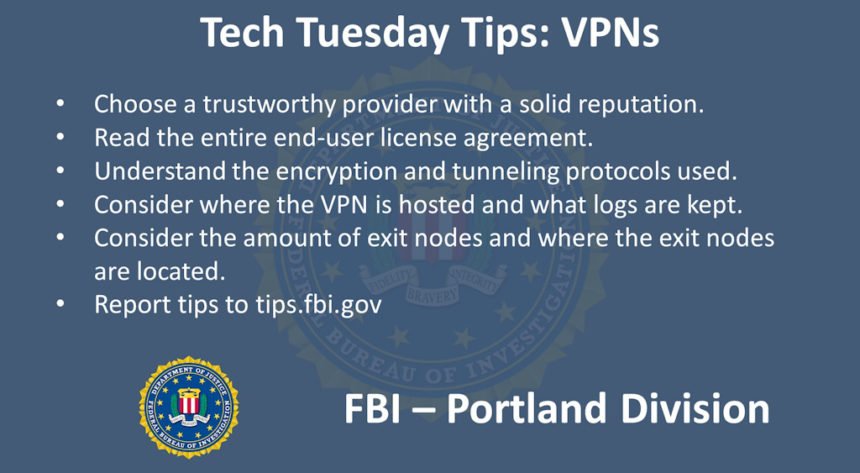Oregon FBI’s Tech Tuesday: VPNs are a safer way online when on the go

PORTLAND, Ore. (KTVZ) -- This week, the Oregon FBI’s Tech Tuesday feature focuses on building a digital defense when you are on the go, using a virtual private network.
It’s easy and convenient to use public Wi-Fi to access the Internet. However, this is risky because you can’t control the security standards of a public Wi-Fi network.
There’s a great solution to this problem: Use a virtual private network, or VPN, to shield your sensitive data.
A VPN creates a secure tunnel for your data to traverse the Internet, using a network of private servers. When you use a VPN, your data is encrypted, or hidden, as it moves from your device to the VPN and then continues onto the Internet through what’s called an exit node.
A VPN creates the appearance that your data is coming from the VPN server, not from your device. Therefore, it’s harder for an attacker to identify you as the source of the data. Even if attackers can intercept your data, the encryption means the attackers can’t understand your data or use it to their advantage.
A VPN is a simple way to keep your organization’s communications and Internet usage more secure, even when they use public Wi-Fi networks at hotels, airports, or other places.
You have many options in choosing a VPN service. Keep in mind that all of your sensitive data will travel through the VPN provider’s servers, which means you must ensure that the provider is trustworthy and enjoys a solid reputation. Consider these questions:
- What’s the cost of the VPN service? Some options are free, some are free up to a certain amount of data usage, some are paid services.
- What encryption and tunneling protocols are used? Some protocols offer increased levels of protection.
- What logs does the VPN keep?
- Where is the VPN hosted? Is it in a foreign country?
- How many devices can you use per account?
- How many exit nodes does the VPN provider maintain, and where are they located?
- What happens if the VPN service goes down?
Make sure you read the entire end-user license agreement to identify which VPN provider may be the best fit. Also, do your own research to confirm that you’re choosing a reputable, trustworthy provider.
Finally, implementing a VPN is usually simple: You’ll sign up for a service and then download and install an application.
Using a VPN is a great way for your organization to keep its communications and Internet activities more private, especially when you have to use public Wi-Fi or other points of access not under your direct control.
Remember your voice matters, so protect it. Go to www.FBI.gov/ProtectedVoices for more information.